WOLE SOYINKA AWARD FOR INVESTIGATIVE REPORTING
Winning Works 2014
Share this
Winner: Juliana Ebere Francis
 Juliana Ebere Francis’ gripping three-part story – Extrajudicial killings: story of SARS and robbery suspects, published February 24, March 3, and March 10, 2014 by The New Telegraph Newspaper, is one of horror, anguish and gross human right abuse by the Nigerian Police Forces’ Special Anti-Robbery Squad (SARS). Citing examples from Lagos, to Port Harcourt, to Anambra states, Juliana recounts the ordeal of real people – Chigozie Ezike, Lucky John, Taiwo Egbayeyomi, Michael Akor, Michael Igwe, Ernest Ezeanochie, Chika Ibeku, Syracuse Ejimonye, Nnamdi Chuks and Godgift Ekerete, all killed by officers of SARS without the benefit of the due process of law. Her story again highlights the heart-wrenching tale of recurring murder of Nigerians, mostly young persons, by those entrusted under the Law to protect them.
Juliana Ebere Francis’ gripping three-part story – Extrajudicial killings: story of SARS and robbery suspects, published February 24, March 3, and March 10, 2014 by The New Telegraph Newspaper, is one of horror, anguish and gross human right abuse by the Nigerian Police Forces’ Special Anti-Robbery Squad (SARS). Citing examples from Lagos, to Port Harcourt, to Anambra states, Juliana recounts the ordeal of real people – Chigozie Ezike, Lucky John, Taiwo Egbayeyomi, Michael Akor, Michael Igwe, Ernest Ezeanochie, Chika Ibeku, Syracuse Ejimonye, Nnamdi Chuks and Godgift Ekerete, all killed by officers of SARS without the benefit of the due process of law. Her story again highlights the heart-wrenching tale of recurring murder of Nigerians, mostly young persons, by those entrusted under the Law to protect them.
Runner-up: Olatunji Ololade and Olukunle Akinrinade
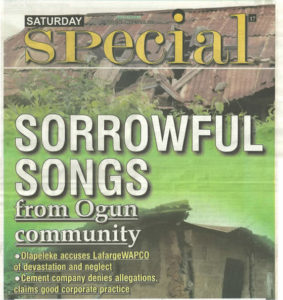 Sorrowful songs from Ogun communities, published in The Nation newspaper on August 16, 23, 30, September 6 and 13 2014, return us to the now familiar theme of resource curse in the destruction of human communities, using the miseries of residents of two neighbouring communities in Ogun state – Opaleke and Ewekoro, as evidence.
Sorrowful songs from Ogun communities, published in The Nation newspaper on August 16, 23, 30, September 6 and 13 2014, return us to the now familiar theme of resource curse in the destruction of human communities, using the miseries of residents of two neighbouring communities in Ogun state – Opaleke and Ewekoro, as evidence.
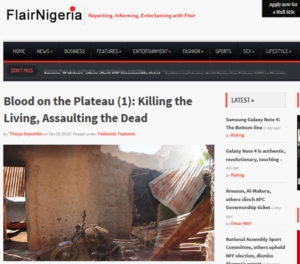 Winner: Fisayo Soyombo
Winner: Fisayo Soyombo
In his five-part story, Blood on the Plateau, published in Flair Nigeria from 28 through 31 December 2013, Fisayo Soyombo, brings vivid evidence of fratricidal carnage that occurs so often in the country. In this one instance, whole families of aged, pregnant women, children, and babies were brutally murdered. Fisayo’s investigation bridges a gap in conflict reporting by naming the dead. He also narrates the consequences of their sudden loss to their families and neighbours employing the tools of pictures and videos.
Runner up: Ibanga Isine
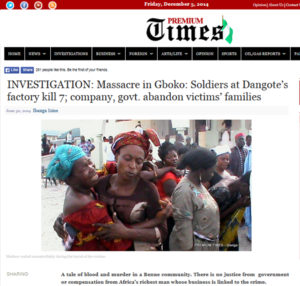 In a five-part serial that ran on 30 June, 2 July, 17 September, 29 September and 3 October 2014 , Premium Times senior correspondent, Ibanga Isine, highlights the height of impunity we confront in the reality of extra-judicial killings in Nigeria. This time, it is of soldiers manning the Dangote Cement factory who killed seven members of the company’s host community – Gboko. The report spurred immediate action by Mr Aliko Dangote, owner of the factory, who visited the community, set up an inquiry committee and paid compensation to the victims’ families.
In a five-part serial that ran on 30 June, 2 July, 17 September, 29 September and 3 October 2014 , Premium Times senior correspondent, Ibanga Isine, highlights the height of impunity we confront in the reality of extra-judicial killings in Nigeria. This time, it is of soldiers manning the Dangote Cement factory who killed seven members of the company’s host community – Gboko. The report spurred immediate action by Mr Aliko Dangote, owner of the factory, who visited the community, set up an inquiry committee and paid compensation to the victims’ families.
Winner: Kunle Ajayi
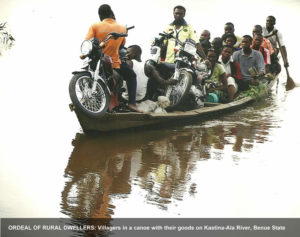 The saying, ‘one picture is worth a thousand words’ is apt for Kunle Ajayi’s Ordeal of rural dwellers, published in The Daily Independent on January 11, 2014. Here, Kunle captures a moment, which tells a full story of how government is failing in its duty to citizens in the absence of basic infrastructure; shares – through his lens – how risky it is moving from one end to another for Nigerians while they endure scarcely available public transportation options.
The saying, ‘one picture is worth a thousand words’ is apt for Kunle Ajayi’s Ordeal of rural dwellers, published in The Daily Independent on January 11, 2014. Here, Kunle captures a moment, which tells a full story of how government is failing in its duty to citizens in the absence of basic infrastructure; shares – through his lens – how risky it is moving from one end to another for Nigerians while they endure scarcely available public transportation options.
Winner: Femi Adedeji
 The discourse around terrorism and its attendant human rights abuse is the theme of Femi Adedeji’s entry titled Haram, which is published in The National Mirror of Sunday May 11, 2014. Through this piece, the cartoonist captures the climate of fear, mindless killings, and abductions in Nigeria and invites the extremists to the table to discuss the violations of human rights to life, dignity, education, freedom of movement and expression among others.
The discourse around terrorism and its attendant human rights abuse is the theme of Femi Adedeji’s entry titled Haram, which is published in The National Mirror of Sunday May 11, 2014. Through this piece, the cartoonist captures the climate of fear, mindless killings, and abductions in Nigeria and invites the extremists to the table to discuss the violations of human rights to life, dignity, education, freedom of movement and expression among others.
Winner: Kelechi Emekalam
In War without end, broadcast on Sunday 27 July, 2014 on Television Continental, Kelechi Emekalam tells the story of the heartbreaking consequences of official neglect, after over four decades of the Nigerian civil war, showing how government’s lack of thoroughness is leading to amputation and sometimes death of citizens. It is an emotional, enterprising and well researched human interest story. The plot is staged in the eastern part of Nigeria where the war was toughest. Bombs and landmines used for the war are lodged in the peoples’ farmlands and backyards and continue to wreck havoc on the young and old alike. For many of the characters in Kelechi’s story, the war remains as fresh as ever.
 Winner: Tobore Ovuorie
Winner: Tobore Ovuorie
Human trafficking is an internationally-acclaimed crime against humanity. Yet, it continues to thrive globally and in Nigeria. In a daring effort to unravel this mind-boggling crime and the cartel that perpetuates it. Tobore Ovuorie travelled as an undercover reporter into the world of human trafficking, bringing back with her a shivering account of killings, rituals and the complicity of government officials in the act through her story – Inside Nigeria’s Ruthless Human Trafficking Mafia published on The Premium Times on January 23, 2014.
 Winner: Olatunji Ololade and Olukunle Akinrinade
Winner: Olatunji Ololade and Olukunle Akinrinade
The now popular brands of herbal gin which lay claim to curing multiple illnesses and increasing sexual ability is the focus of Deadly Potions: Nigeria’s herbal gin nightmare, a three-part story published in The Nation Newspaper on April 12, 19 and July 5, 2014 by Olatunji Ololade and Olukunle Akinrinade. The duo employ the verification of facts by laboratory tests of five samples of such products and blood from their consumers, as well as report verification by medical experts, to prove beyond doubt that the herbal gins are harmful to the human system.
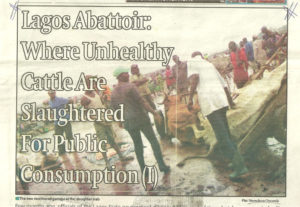 Runner-up: Nurudeen Oyewole
Runner-up: Nurudeen Oyewole
The entry, Lagos abattoir: where unhealthy cattle are slaughtered for public consumption, corroborates the narrative of regulatory failure that pervades Nigeria. He reports on the unhealthy state of abattoirs in Nigeria using the Lagos state run Oko-Oba Agege abattoir as an example. According to the report, the abattoir is filthy, and sick animals are slaughtered for sale right in the presence of veteran medical officers whose jobs are to ensure strict compliance to health standards.
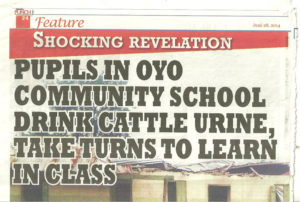 Winner: Eric Dumo
Winner: Eric Dumo
This story Published in The Punch Newspaper of June 28, July 5 and August 23, 2014 showcases the unbelievable living condition of residents of Opoo, a community on the outskirts of Okaka, in Itesiwaju local government area of Oyo State. It tells the incredible story of how Pupils in an Oyo community school drank cattle urine, and took turns to learn in class; a gripping commentary on the typical ineffectiveness of local government administration in Nigeria.
Runner-up: Seun Okinbaloye
Reported on the Channels Television on February 2 and 13, 2014, the entry titled Lagos community neglect: Ori Okuta infrastructure deficit, is a story that shows the absence of good governance at the local tier of government in Nigeria. It narrates how pleas for motorable road, potable water supply and health care service by residents of Ori Okuta area of Ikorodu to the Lagos State government have gone unheeded, leaving the people to resort to self help; in all practical ways to make living meaningful. The report elicited government action, forcing the Oyo state government to construct a new school, refurbish the health centre, while construction has started on the seven-kilometre road leading to the village.

